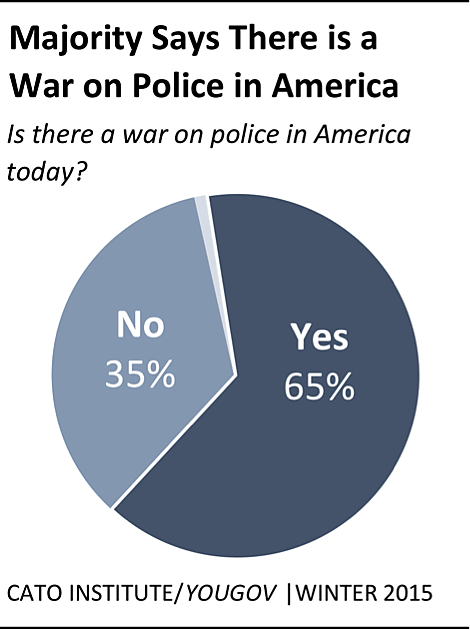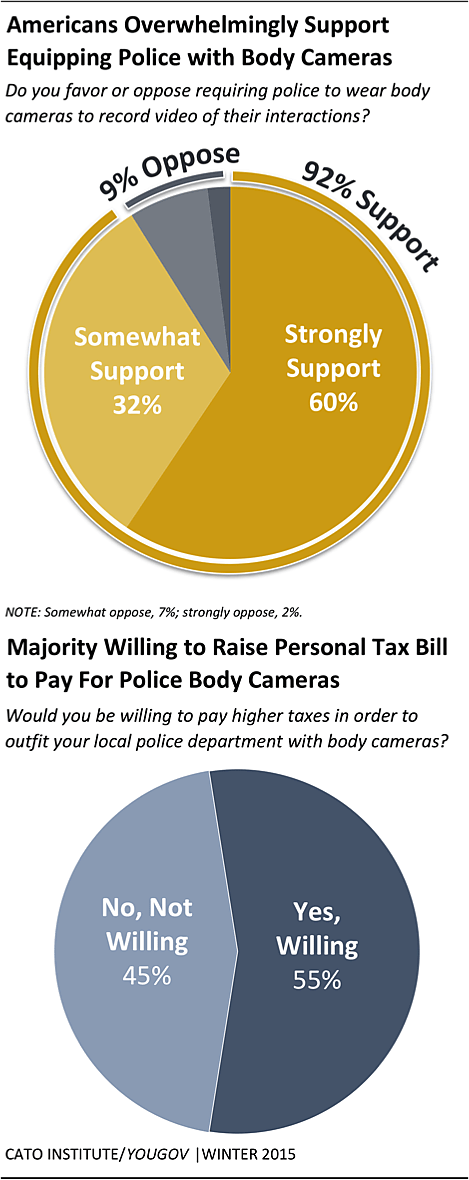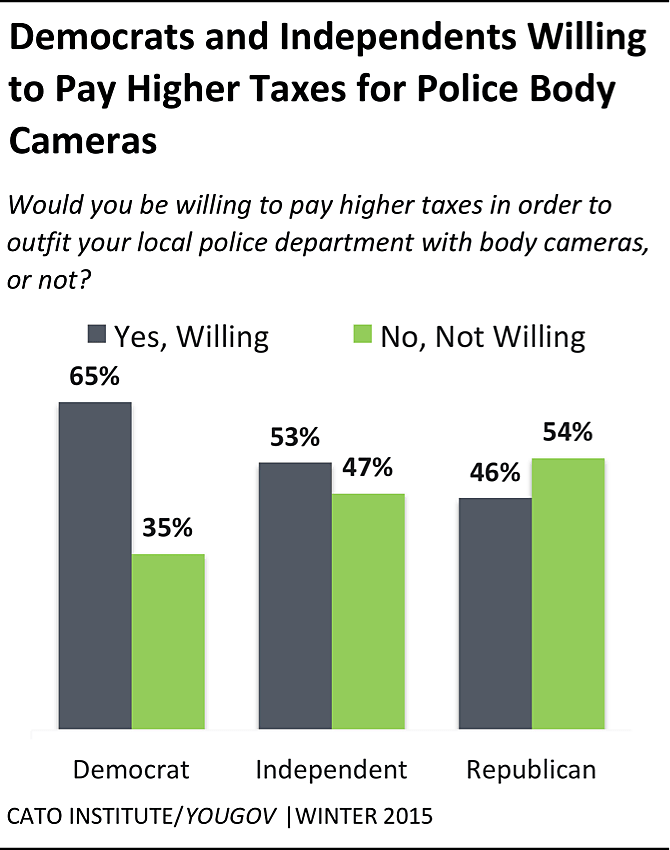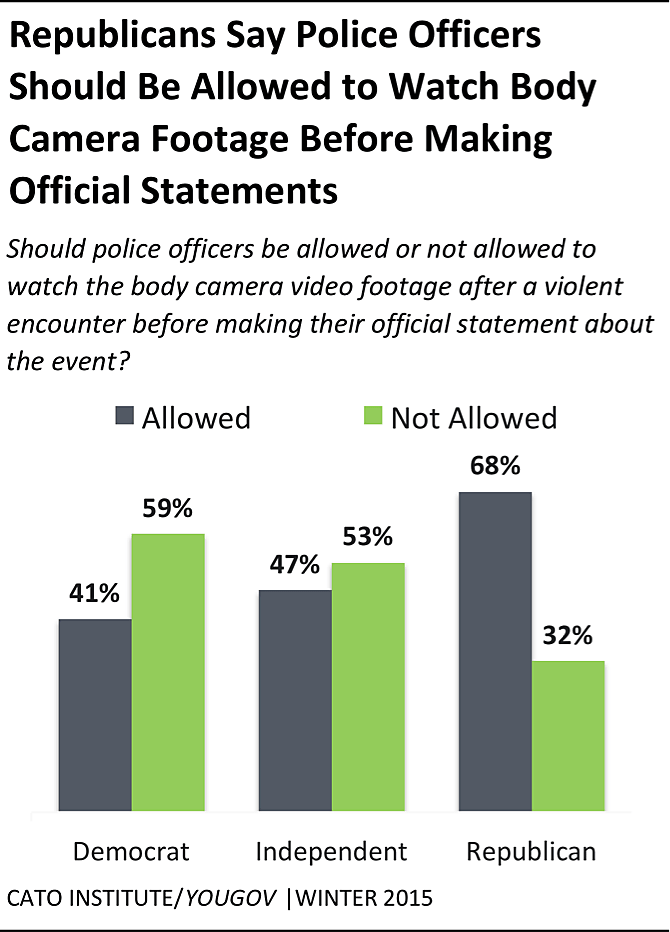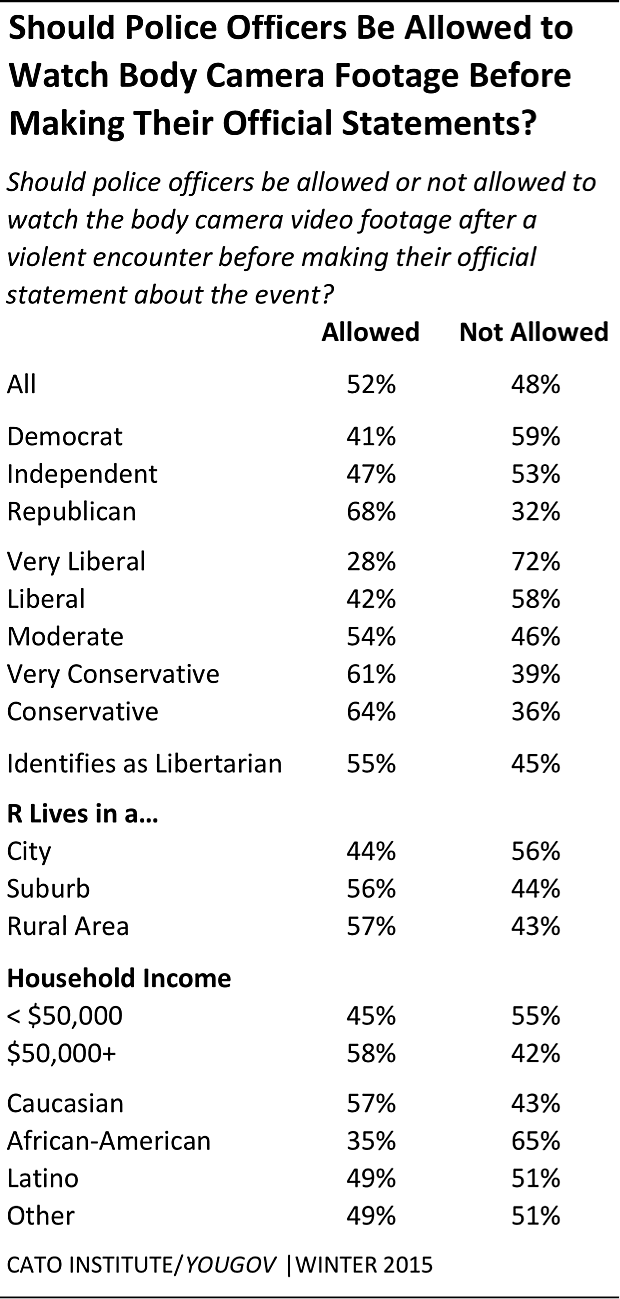Amidst increased public scrutiny of policing practices and rising concerns over police officer safety, a recent Cato/YouGov national survey finds fully 65% of Americans say there is a “war on police” in America today. Majorities across partisan groups share this view, although Republicans (81%) express greater concern than independents (62%) and Democrats (55%).
While Americans are concerned about police safety, this does not mean they wish to avoid reform. Instead, Americans overwhelming support (92%) requiring police officers wear body cameras that would record video of their interactions. Moreover fully 6 in 10 “strongly support” such a proposal. A paltry 8% oppose police wearing body cameras. Support extends across demographic and political groups. In an era of hyper-partisanship, police wearing body cameras achieves rare post-partisan consensus.
Sign up here for Cato’s regular digest of Public Opinion Insights.
Studies of police departments reveal officers perceive public support for body cameras as an indication of public distrust. However, this does not comport with this survey’s findings. Americans who have a favorable opinion of the police are as likely as those with an unfavorable view to support implementing a police body camera program in their community.
Moreover, Americans do not view the police wearing body cameras as exclusively protecting citizens from the police. Instead, 81% believe such a policy will protect both—the police officers who wear them and the citizens who interact with the police—equally. Only 10% expect cameras to protect citizens more and 9% percent expect cameras to protect police officers more. While African-Americans and Hispanics (19%) are about three times as likely as Caucasians (7%) to say cameras will primarily protect citizens, overwhelming shares of all groups still say cameras will protect both members of the public and officers equally.
A truth too often overlooked is that public support for a policy is not synonymous with a willingness to pay for it. However in the case of body cameras, a majority—55%—of Americans says they would be willing to pay higher taxes in order to outfit their local police department with body cameras, while 45% would not support increased taxes for this purpose. Nevertheless, it is worth emphasizing that if support were contingent on raising additional revenues, initial support decreases a substantial 37 points.
Politics, rather than demographics, primarily drive attitudes toward tax increases for body cameras. Sixty-five percent of Democrats (including independent leaners) say they’d pay higher taxes in exchange for a police body camera program, while 35% oppose. Conversely, a majority (54%) of Republicans (including leaners) oppose raising additional revenues and prefer local governments redirect funds from other programs to pay for police body cameras, while 46% would favor. There are not significant differences across race, gender, and age. Furthermore, favorability toward the police does not correlate with support for raising tax revenues for cameras.
Police body camera policy becomes particularly contentious when it comes to accessing the video footage. Fifty-two percent of Americans say police officers ought to be allowed to watch body camera footage before making their official statement about violent encounters, while 48% oppose. Recent legislative trends have favored police advocates’ recommendation that police officers be allowed to view video footage before making any official statements. They reason doing so allows officers to “more clearly” remember a stressful incident and point out that officers will still have to explain their actions. However body camera advocates have warned that allowing officers to view the footage beforehand creates an opportunity for officers to change their stories in efforts to absolve themselves from blame. This will likely remain a contentious policy issue going forward.
Public support for early officer access to video footage hinges largely on favorability toward the police. Among those with a favorable opinion of the police, 61% say officers should be allowed to watch the video footage before making a statement, while 39% say they should not. Results are reversed among those with an unfavorable view of the police: 74% say officers should not be allowed to watch the footage while 26% say they should. There are stark political divisions as well: 59% of Democrats oppose early access while 68% of Republicans favor early access. Non-partisan independents are divided but lean with Democrats with 53% opposed to early video access. A similar pattern emerges across ideology, with respondents who identify as “very liberal” stridently opposed (72%) while “very conservative” respondents are firmly in support (64%). Self-identified libertarians reflect moderates with slightly more in favor than opposed (55% v 45%).
Race, income, and living in a city or suburb also correlate with support for officers obtaining early access to body camera footage. Majorities of Caucasians (57%), individuals living in the suburbs and rural areas (56%), and households making more than $50,000 a year (58%) say officers ought to be allowed to watch camera footage before making an official statement of a violent encounter. Conversely, majorities of African-Americans (65%), Latinos (51%), city dwellers (56%), and households making less than $50,000 a year (55%) oppose allowing an officer view video footage before making an official statement. A simple statistical model that simultaneously controls for race/ethnicity, urban density, and income finds that race and living in a city both exert independent effects on attitudes, while income loses statistical importance.
Conclusions
Americans support equipping their local police departments with body cameras even if doing so requires them pay higher taxes. Furthermore, animus toward the police does not appear to drive support for police body cameras. Police favorability does not correlate with support for the program, raising taxes to pay for cameras, or whether one believes cameras better protect citizens or police officers.
One explanation for broad public support is that different groups favor body cameras and raising revenues to pay for them for different reasons. Those who trust the police may view cameras as a safeguard protecting police officers from frivolous lawsuits or may encourage citizens to behave better when interacting with cops. Furthermore, this disproportionately conservative group also tends to view policing as part of the proper role for government and thus may be more willing to raise taxes for this purpose. On the other side, those distrustful of the police may view cameras as a way to encourage officers to behave better and will make it easier to hold officers accountable for misconduct.
Favorability—and by extension public trust—of the police does play a significant role when it comes to providing individual officers early access of video footage. Those with greater confidence in their local departments likely trust that officers won’t use their early access to change their stories or mislead investigators. Conversely those who lack confidence in their local police likely worry that officers who view footage before making statements will use the opportunity to absolve themselves from blame.
For more public opinion analysis and upcoming public opinion studies sign up here for Cato’s regular digest of Public Opinion Insights.
The Cato Institute/YouGov national survey of 2000 adults was conducted November 19–24, 2015 using a sample drawn from YouGov’s online panel, which is designed to be representative of the US population. The margin of sampling error for all respondents is +/-3.27 percentage points. Topline (.pdf) results can be found here, full methodological details can be found here.
Note: In this report, Democrats include independents who lean Democratic and Republicans include independents who lean Republican. Independents include those who said they did not lean toward either the Democratic or Republican parties.
